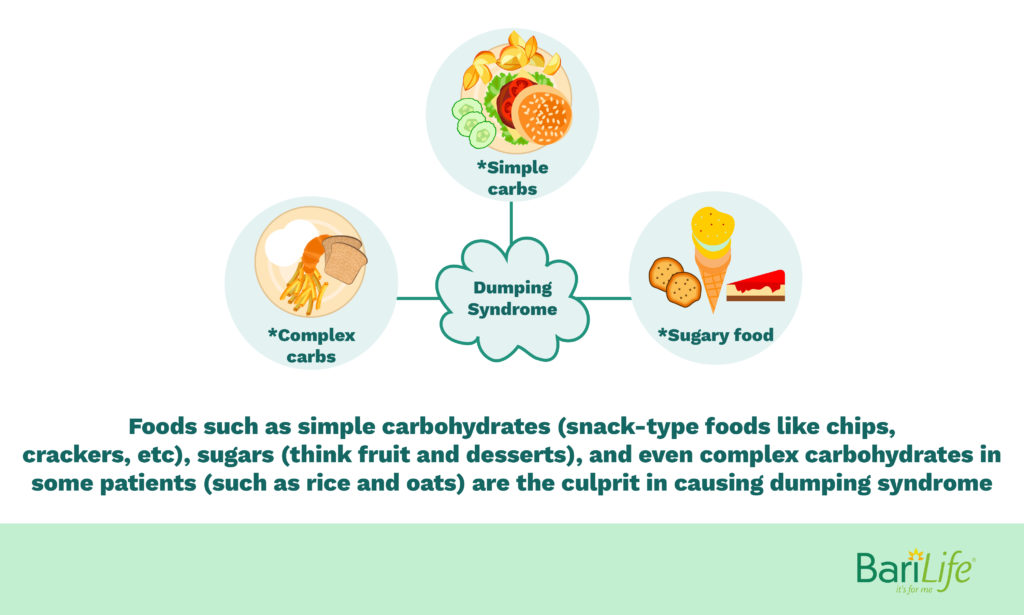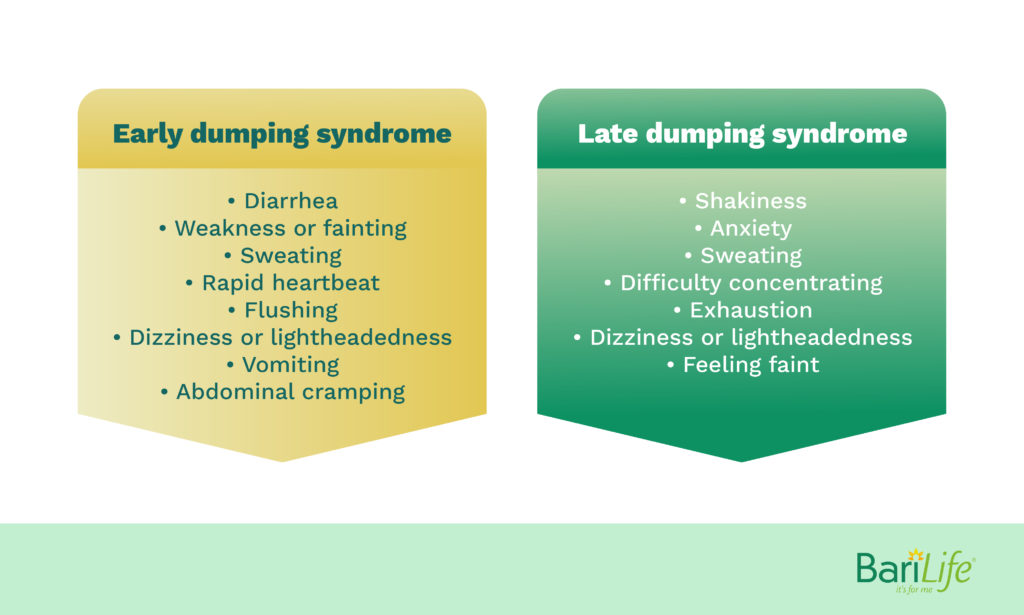ENTER YOUR EMAIL ADDRESS TO UNLOCK
15% OFF
on your first order
Some exclusions apply.
Everyone’s body adjusts and adapts to surgery differently and there’s no way to predict what your body will do. The hard part is not knowing how your body will react to certain foods. Furthermore, even if you experience dumping, it doesn’t mean you’ll have all of the symptoms listed above.
You may be more prone to sweating and feeling faint, while the next person may deal more with abdominal cramping and diarrhea.
It can be tricky to identify what foods cause dumping syndrome since it can vary from person to person. What’s just as challenging is making positive dietary changes to avoid it from happening.
It’s important to realize that even if you don’t experience dumping syndrome, it’s not a free pass to consistently consume high sugar/high carbohydrate foods if your ultimate goal is weight loss and keeping the weight off.
So what foods tend to be problematic and cause dumping syndrome? It should be noted that the complex carbohydrate foods listed above are healthy food choices. As are the fruits and dairy products. It does not mean if you consume brown rice or fruit salad, you will experience dumping syndrome.
I’ve worked with patients who identified strawberries as a cause of their dumping syndrome, whereas the next patient could tolerate them.
Other patients experienced dumping syndrome when they consumed whole wheat bread, yet others could consume white bread with no issues.
Everyone is different.
Troubleshooting your dumping syndrome causes When I work with patients dealing with dumping syndrome, the first step is to eliminate the trigger food. It may take a bit of troubleshooting to determine what food(s) are causing the symptoms, but anything with carbohydrates could be our problem.
We need to look at beverages and snacks, along with the composition of meals – always eat protein and carbohydrates together. When you eat carbohydrates by themselves, they are more likely to cause dumping syndrome and reactive hypoglycemia.
Keep in mind there are lots of general bariatric diet guidelines out there, but it’s not a one-size-fits-all. Even if you’re following the appropriate diet phase, we may need to make adjustments to your specific intake to prevent unpleasant symptoms and keep you on track to achieving your weight loss goals.
Let’s get an idea of what a food recall might look like that causes dumping syndrome (Remember: these foods may not cause dumping in everyone post-bariatric surgery. Also, notice the high calorie, non-nutritious foods choices that don’t help with weight loss):
Meal Time Bad Food
Breakfast: Frosted Flakes with skim milk + banana
Lunch: Peanut butter and jelly sandwich on white bread + chips
Dinner: Grilled chicken + baked potato and corn
Snacks: breakfast/snack bar + dried fruit
Beverages: water, coffee with sugar and creamer, Coca-Cola
Now, how could we make changes to eliminate the foods that can cause dumping syndrome, reduce caloric intake, and initiate weight loss?
Meal Time Good Food
Breakfast: 2 eggs + ½ banana
Lunch: Deli turkey sandwich on whole wheat bread + carrot and celery sticks
Dinner: Grilled chicken + ½ sweet potato and steamed broccoli
Snacks: protein bar/shake or light Greek yogurt
Beverages: water, coffee with Splenda and zero sugar creamer, Diet Coke
As you can see, a healthy bariatric diet consists of lean protein foods, whole grains, and non-starchy vegetables.
Which foods should you eat to PREVENT dumping syndrome?
[box]
Lean protein foods:
Poultry – Chicken and turkey
Lean beef and pork
Fish and shellfish
Low-fat cottage cheese
Light Greek yogurt
Low-fat cheese
Eggs and egg whites
Whole grains:
Brown rice
Quinoa
Oats
Whole grain, whole wheat pasta or bread
Non-starchy vegetables:
ANY vegetable that is not peas, potatoes, corn, or squash is considered a non-starchy vegetable!
[/box]
So what’s the take-away about dumping syndrome? Nutrition changes not only prevent complications such as dumping syndrome post-bariatric surgery, but they are also crucial to successful weight loss.
Reach out to your bariatric practice and have consistent follow up with your Registered Dietitian. Follow the bariatric diet provided by your surgeon and avoid the foods that are known to cause problems.
If you do experience dumping syndrome, start a symptoms log and food journal.
You may be able to pinpoint the problem food(s), but if you can’t, when you meet with your Registered Dietitian, those journals will be helpful in determining what’s going on and the best way to resolve the symptoms.
Remember that bariatric surgery is a tool – it takes commitment, behavior change, and diet changes to make it work and achieve your goals. But your multi-disciplinary team is there for you!
We want to support you, guide you, and make this process work for you! You’ve got this! You’re doing great!

